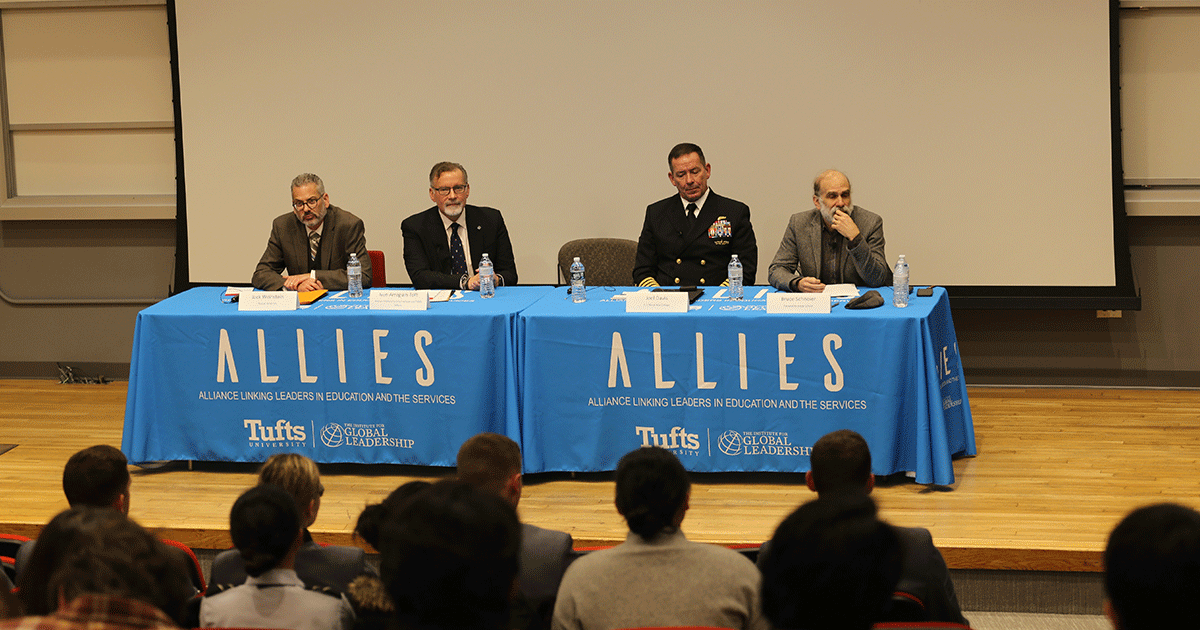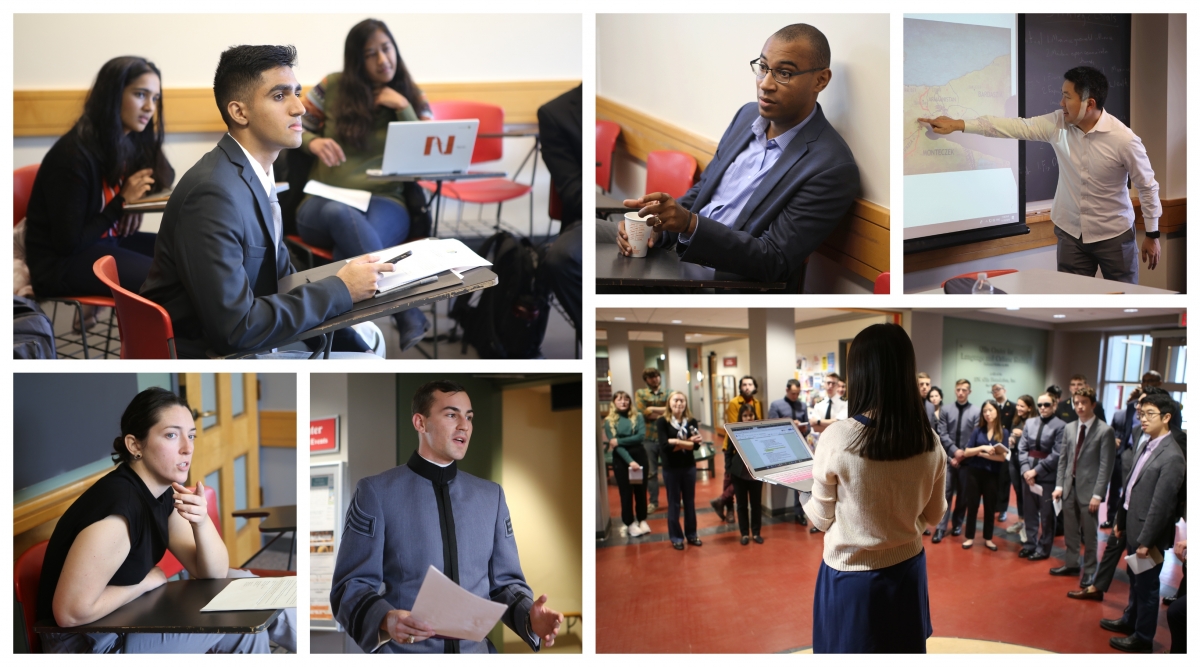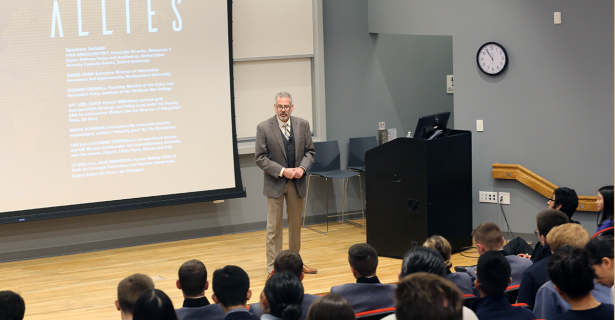CMRC 2019: Keynote by Lt. Gen (RET) Jack Weinstein
by Denise Looi (A’20)
In the fall, Tufts ALLIES held its Sixth Annual Civil Military Relations Conference (CMRC) on Cyber Security and Geopolitics. The conference focused on current issues surrounding the cyber realm and their implications on national security in both military and civilian spheres. Cadets from the US Military Academy at West Point and the US Naval Academy, along with students from Tufts and other Boston area schools, came together to learn from the panels and each other during the two-day conference.
The keynote speaker for this year’s conference was Lt. Gen. (RET) Jack Weinstein, who had a long career in the U.S. Air Force and is currently a professor of the practice at Boston University’s Pardee School of Global Studies. Lt. Gen. Weinstein first opened his address with an interactive series of questions, prompting the audience to consider their everyday interactions with technology and cyber. He talked about fake news and the manipulation of information as one of the biggest threats to national security, where the decision-making processes are often affected.
In response to the growing domain of cyber, Lt. Gen. Weinstein outlined a few national strategies that the US has taken on in recent years, from acknowledging cyber as a new and rapidly rising warfighting domain to how the US has since been challenged to find new solutions to deal with rapidly-changing cyber issues. Given the speed of developments in the cyber domain, recklessness may potentially become a problem for policy makers.
Let. Gen. Weinstein urged participants to remain interested in STEM fields and encouraged students who are not necessarily studying STEM fields to remain open to and continue reading up on news and information about cyber and technology.
CMRC 2019: Panel Discussions
by Ian Kim (A’23) and Dylan Miles (A’21)

ALLIES’ Sixth Annual Civil Military Relations Conference (CMRC) on Cyber Security and Geopolitics featured two panel discussions with academics, private practitioners, and military officers as panellists. The first panel was focused on the Past, Present, and Future of Cybersecurity, while the second panel looked at Emerging Technology and the Transformation of the Defense Industry.
On the first panel was Professor Ivan Arreguin-Toft from Brown University, Mr. Bruce Schneier from Harvard University, CPT Joel Davis from the Naval War College, and the keynote speaker Lt. Gen. (RET) Jack Weinstein.
Professor Arreguin-Toft presented on the fundamentals of cybersecurity. He discussed cybersecurity in the context of consent and how “cyber harm” can occur with and without user consent. He also covered how war is about coercion and how contemporary actors now reach the traditional ends of war (coercion) without the traditional means (killing). When asked how to get small companies and other entities better cybersecurity, Professor Arreguin-Toft suggested developing analog alternatives and backup systems in case essential electronic systems fail or are disabled.
Mr. Schneier explained how computers are being integrated into non-computed spaces, from refrigerators to cars and infrastructure. While many devices, such as smartphones, are kept secure through a consistent patch system, other objects that are not replaced or updated are left vulnerable to exploitation.
Capt. Joel Davis discussed the balance between being secure and preventing overreach. He points out that a “cyberforce” is unnecessary, and that the US needs to prioritize what is important rather than trying to cover as much as possible.
The cadets and students gained a new understanding of cybersecurity through the insights of the four panelists. While each speaker had a different perspective, they all stressed the increasingly crucial role cybersecurity plays in keeping systems and communities safe.
On the second panel were Professor Agnes Chan, a renowned expert in cryptography and communication security who is also a professor emeritus of computer science at Northeastern University, and CMDR (RET) Raymond Tortorelli, a professor at the US Naval War College who has extensive experience in electronic warfare and who has also served at the National Security Agency.
CMDR Tortorelli discussed his experience leading the team that would intentionally breach United States government computer systems in order to test their vulnerability, with Professor Chan further noting that increasingly advanced computer systems often fail to ameliorate this problem as added complexity invariably leads to added vulnerability. The conversation also moved to China’s rapidly escalating cyber capability and its implications for American national security, with CMDR Tortorelli noting that one Chinese city government alone had spent 50 percent more on artificial intelligence research than the entire United States government.
Professor Chan further noted that American policy in this area has always started from the presumption that the United States has the most computing power, but that we have now entered an era in which China has the most processing power. CMDR Tortorelli concluded by discussing the inherent difficulty in trying to predict and even attribute cyber threats, recalling advice from a superior in the immediate aftermath of the September 11th attacks that “the problem isn’t getting information, the problem is getting the right information to the right people at the right time.”
CMRC 2019: Simulation
By: Jackson Lubke (A’23)

As part of the 2019 ALLIES Civilian-Military Relations Conference (CMRC), there was a simulation on November 10th dealing with this year’s theme of cybersecurity and geopolitics. This simulation has been a staple of CMRC conferences since their inception, and the wargaming scenario was crafted entirely by the ALLIES team.
Participants in the simulation came from many different academic backgrounds, as students from civilian and service academies attended. Each of these people brought with them many experiences and different areas of expertise and had to put all of their disparate skills to the test in the simulation.
The scenario involved five different countries dealing with unsteady peace after a devastating war, alongside a monopolistic corporation. Participants had to grapple with complicated ethnic ties and political struggles as they attempted to either build an oil pipeline across the continent or prevent its construction. They fought towards their ultimate goals using limited resources with an emphasis on utilizing cyber capabilities both offensively and defensively.
Throughout the simulation, alliances were formed, cyberwarfare waged, intrigue gathered, and assassinations attempted. Many teams were forced to deal with the real-world consequences of mass cyber-attacks when their operations were shut down without warning. One team even had its social media accounts hacked, simulating misinformation campaigns.
Advisors, many of them graduate students from the Fletcher School, provided expert advice to the teams and gave them direction when needed. The students, for their part, proved very capable as both leaders and cabinet members of the great powers, navigating through various twists and turns that lead to proxy conflicts, mass migration, and even direct war. Forming strong groups, they found the importance of teamwork and flexibility in diplomacy and group efforts.
Bringing together students from private colleges and the service academies, the CMRC simulation offered a unique opportunity that allowed both civilians and military personnel to learn from their respective spheres, as well practice many of the concepts that they discuss in theory and learn about in the classroom. The simulation is always a valuable learning experience that builds real relationships for years to come and future simulations will continue to challenge students while constructing important friendships.

